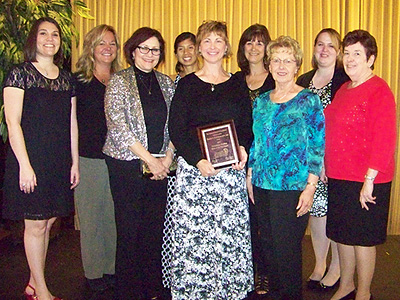
The Leukemia Research Foundation recently named oncology nurse and Elmhurst College alumna Elizabeth Hurter the 2014 Nurse of the Year.
To this day, whether she’s tending critically ill patients or teaching new nurses, Hurter draws on the wisdom she gained from professors at Elmhurst College nearly two decades ago.
An acute-care nurse practitioner in the Inpatient Adult Bone Marrow/Stem Cell Transplant Unit at the University of Chicago Medicine, Hurter graduated from Elmhurst in 1995 with a bachelor’s degree in nursing. “I can still picture (my professors) and see them in front of me,” Hurter said. “I learned lessons that have stuck with me, and I pass them on to my nursing students.”
The Nurse of the Year Award has been presented annually since 1996 by the Wilmette-based Leukemia Research Foundation, or LRF. The award was created to recognize hematology-oncology nurses “who give their time, compassion and heart each and every day,” said Linda Kabot, the LRF’s director of programs. Nominations from hospitals throughout Illinois and parts of Wisconsin and Indiana are submitted annually by patients and families affected by blood cancers, as well by colleagues and coworkers.
Hurter was nominated by three of her colleagues, including fellow Elmhurst graduate Carol White ’85, who won the LRF Nurse of the Year award in 1997.
“What sets Beth apart is her sense of compassion and humor and profound dedication to work for the good of her patients,” White said.
Before starting nursing school, Hurter was living in Lombard with her family and working as an X-ray technician. She enjoyed her job but longed to have more interaction with patients. She chose Elmhurst College to study nursing because of its close location and reputation for top-rate instruction.
“You hear a lot of things about nursing school being very intimidating and cutthroat, but I was just overwhelmed at how much the instructors at Elmhurst wanted you to succeed and were willing to help you do that,” she said. “They were willing to meet after hours if you didn’t understand a topic. They always made themselves available. I think that is something that you can’t really put a price tag on. It was a great experience.”
Of course, nursing school was still tough and instructors didn’t coddle students. Hurter recalled a time when she forgot to turn over the last page of a test, which had six additional questions. The instructor didn’t let her retake the test, and reminded her that paying attention to details in nursing is essential, if not life-saving. From then on, Hurter started all her tests from the last page.
“They taught me life lessons and I appreciated that,” Hurter said.
Hurter eventually received her master’s degree in nursing and found her calling among the desperately ill blood cancer patients at the University of Chicago Medicine, where the days are at once exhilarating and draining.
The medical team on her floor treats patients with blood cancers, such as leukemia, with blood stem cell transplants from relatives or another match donor. Hurter describes herself as pragmatic, compassionate and witty, whether she’s holding a patient’s hand as she explains treatment or speaking with family members about a diagnosis.
Inevitably, when someone finds out what Hurter does, they ask how she handles a job that appears so depressing. She immediately corrects them, explaining that she welcomes the opportunity to work with cancer patients because she can offer treatments that work—although, she adds, “cancer nursing is not for wimps.”
“A lot has changed in what we offer. We offer opportunities to people, great opportunities that put patients into remission,” she said. “It’s very rewarding to see people get well and live their lives.”
It’s not a perfect job, she added, but the hard days are easier to endure when she remembers this treasured bit of advice from an Elmhurst professor: Hang on to the “goodies” you get from patients—the hugs, the thank yous, the cards—because they’ll carry you through the bad days.
“No matter what happens, there’s always something good in each day,” she said.